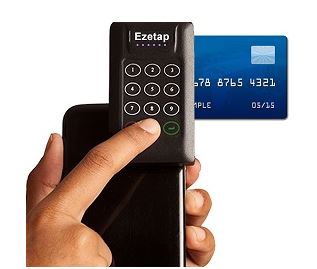India's Ezetap $50 mobile POS set to unlock local market

In India, credit card and debit card transactions are expected to touch US$862 million this year, a growth of 33 percent from the year before, reports Techgig.com. As such, Bangalore-based Ezetap has launched a US$50 mobile point of sale device for the Indian market, with plans to sell one million devices over the next two years.

Customers need to simply swipe either their credit card or debit card on their mobile device to complete the transaction, as the device itself is a lightweight card reader that can be plugged into any smart device or featurephone user by the retailer.
This is a great device for the Indian market, as installation of near field communication (NFC) readers across India will still take some to fully implement. Furthermore, not all handsets sold in India at the moment have NFC to begin with either.
This will also benefit consumers who want to make payments via either a credit card or debit card in places where there aren't facilities to begin with. A majority of small retailers across India aren't equipped with the resources and technology to handle a simple credit card or debit card payment. In fact, most places don't even have a cash register.
Furthermore, ATM machines aren't always nearby, and even then, in many cases there are long queues or they are out of service. I've seen this occur in more than half of the trips I've made to the local ATM by my house, so I know this first hand by experience.
In Canada and the U.S., a similar device, Square, has become quite popular over the past few years. However, it doesn't appear they have entered the Indian market, as of yet, and as such, this could be Ezetap's advantage for now.
On the flipside, the similarities between Ezetap's device and Square are quite close, and I wonder if the developers behind Square are even aware that a similar device is already available in India. It's also safe to assume that perhaps Ezetap simply created their own Indian version of Square, knowing that there is already a similar device.
That being said, other payment options, such as PayPal, continue to remain active and strong in India. In fact, it is one of the preferred choices of payment between consumers and retailers, depending on the distance between the two and the transactions being made. Generally speaking, PayPal is more popular for receiving payments for contract work done in India, as the funds aren't in the direct eye of India's Income Tax (IT) Department.
Ezetap has the potential to finally unlock and capture the Indian market with their device, allowing consumers the freedom to pay without cash. Of course, it will depend on whether retailers want to fully embrace and implement the technology too.
It also appears that in contrast to credit card and debit card purchases where the retailer can either impose a service charge to the consumer, in addition to charges from banks, if applicable, there are no charges from using the Ezetap device. If anything, this could be the biggest selling point and drive to sell one million units, if not more, within two years.